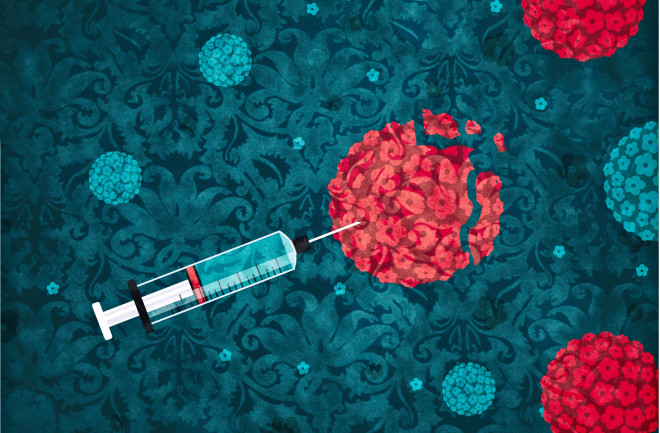For decades, cancer vaccines have been touted as a technology with transformative potential — a promise that always seemed to lie beyond some distant horizon. In 2023, however, the results of two clinical trials hinted that the transformation may be near.
The first report came in April, at the annual meeting of the American Association for Cancer Research (ASCO). It concerned melanoma, the deadliest form of skin cancer. In patients whose tumors had been surgically removed, researchers announced, an experimental therapeutic vaccine cut the risk of recurrence by 44 percent compared with the immunotherapy drug pembrolizumab alone — the standard therapy in such cases.
These findings have “absolutely breathed new life into the cancer vaccine field,” declared lead author Jeffrey Weber, deputy director of NYU Langone’s Laura and Isaac Perlmutter Cancer Center, at the ASCO conference. “I say that as a bona fide skeptic who has put hundreds of patients on prior trials and seen no benefit until now.”
What are the Advancements in Cancer Vaccines?
The jab that changed Weber’s mind belongs to a new generation of cancer vaccines. Previous approaches attempted to train the immune system to recognize a protein typically overexpressed by a given type of cancer, though that antigen might also be present in ordinary cells. The experimental shot, developed by the pharma companies Moderna and Merck, targets neoantigens — proteins expressed by an individual’s unique cancer, but not by normal cells. This personalized inoculation, based on the same mRNA platform as Moderna’s COVID-19 vaccine, can target up to 34 neoantigens at once.
In the phase 2 trial, 107 subjects who’d had surgery to remove melanoma from lymph nodes or other organs received both the vaccine and pembrolizumab, which protects T cells — the immune system’s foot soldiers — from being deactivated by cancer cells. Another 50 received only pembrolizumab. Among the vaccinated group, melanoma returned in just 22 percent of patients within two years, compared to 40 percent in the control group. Most side effects were mild, and immune-related adverse effects (such as endocrine problems) were similar in both groups, suggesting that most came from the drug, not the shot.
More research will be needed to confirm the vaccine’s efficacy, and a larger phase 3 trial is now underway. “I’m getting flooded by patients saying, ‘How can I get this?’ ” says M.D. Anderson Cancer Center oncologist Rodabe Amaria. “It’s not ready for prime time, but the initial data looks very encouraging.”
What are Other Breakthroughs for Cancer Treatment?
That wasn’t the only success story for new cancer vaccines this year. In May, researchers at the Memorial Sloan Kettering Cancer Center in New York reported a similar breakthrough with pancreatic ductal adenocarcinoma, the most common pancreatic cancer, a disease with a mortality rate of 88 percent. In many ways, this cancer is a harder target than melanoma, often going unnoticed until it has spread widely. Surgery is the main form of treatment, but its recurrence rate is nearly 90 percent within seven to nine months. And chemotherapy and immunotherapy drugs usually do little to improve survival.
All of this helps explain why a small phase 1 study, published in the journal Nature, made such a big splash. Led by surgeon Vinod Balachandran, the team removed tumors from 16 patients and sent samples to Germany. There, scientists at BioNTech analyzed the neoantigens in each patient’s cancer cells and used that data to produce personalized mRNA vaccines tailored to each individual.
Along with those shots, the patients received the immunotherapy drug atezolizumab and an adjuvant — a substance that increases a vaccine’s effects. All but one patient underwent chemo, as well. The combination provoked an immune response in half the cases, far exceeding the efficacy of any previous treatment for pancreatic cancer. In patients who did not respond, the cancer returned around 13 months after surgery. But the 8 out of 16 who did respond showed no signs of recurrence during the 18 months of the study.
As with the melanoma vaccine, experts caution that it’s too early to declare victory for this new weapon in the war on cancer. Still, says Johns Hopkins oncologist Neeha Zaidi, “These results are very compelling, and they certainly set the stage for larger studies in the future.”
This story was originally published in our January February 2024 issue. Click here to subscribe to read more stories like this one.

